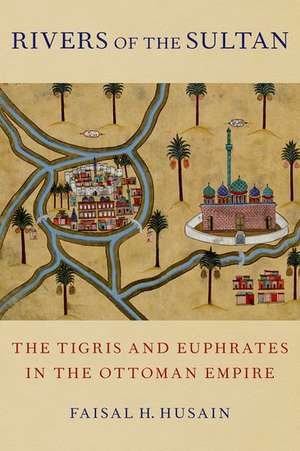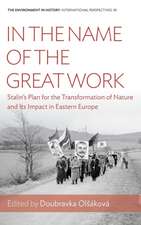Rivers of the Sultan: The Tigris and Euphrates in the Ottoman Empire
Autor Faisal H. Husainen Limba Engleză Hardback – 2 aug 2021
The Tigris and Euphrates rivers run through the heart of the Middle East and merge in the area of Mesopotamia known as the "cradle of civilization." In their long and volatile political history, the sixteenth century ushered in a rare era of stability and integration. A series of military campaigns between the Mediterranean Sea and the Persian Gulf brought the entirety of their flow under the institutional control of the Ottoman Empire, then at the peak of itspower and wealth. Rivers of the Sultan tells the history of the Tigris and Euphrates during the early modern period. Under the leadership of Sultan Süleyman I, the rivers became Ottoman from mountain to ocean, managed by a political elite that pledged allegiance to a single household, professed a common religion, spoke a lingua franca, and received orders from a central administration based in Istanbul. Faisal Husain details how Ottoman unification institutionalized cooperation among the rivers'dominant users and improved the exploitation of their waters for navigation and food production. Istanbul harnessed the energy and resources of the rivers for its security and economic needs through a complex network of forts, canals, bridges, and shipyards. Above all, the imperial approach to river managementrebalanced the natural resource disparity within the Tigris-Euphrates basin. Istanbul regularly organized shipments of grain, metal, and timber from upstream areas of surplus in Anatolia to downstream areas of need in Iraq. Through this policy of natural resource redistribution, the Ottoman Empire strengthened its presence in the eastern borderland region with the Safavid Empire and fended off challenges to its authority. Placing these world historic bodies of water at its center, Rivers of the Sultan reveals intimate bonds between state and society, metropole and periphery, and nature and culture in the early modern world.
Preț: 226.33 lei
Preț vechi: 263.40 lei
-14% Nou
43.35€ • 47.03$ • 36.12£
Carte tipărită la comandă
Livrare economică 23-29 noiembrie
Specificații
ISBN-10: 0197547273
Pagini: 278
Ilustrații: 27 halftones
Dimensiuni: 152 x 236 x 23 mm
Greutate: 0.54 kg
Editura: Oxford University Press
Colecția OUP USA
Locul publicării:New York, United States
Recenzii
An empirically rich and methodologically sophisticated study that makes high-stakes contributions to various historiographies...In certain cases, the strength of some of Husain's arguments come from his ability to situate Ottoman practices of environmental management within larger contexts that non- specialists can appreciate....Husain deserves much credit for being able to weave such a remarkably complex (and fascinating) story for a region of the Ottoman Empire whose history is notoriously difficult to examine on account of a dearth of archival sources, particularly in Iraq—one of the many unfortunate results of wars in recent decades....Written in lucid and accessible prose, Rivers of the Sultan also serves as a model for how to write the environmental history of rivers.
Faisal Husain redresses the silence on the first two centuries of Ottoman rule, the sixteenth and seventeenth centuries, with this impressive study....Husain relates this fascinating tale of environmental control and ecological disaster in a clear and compelling style. His marshalling of diverse sources is impressive and convincing. Although this is ostensibly on the Ottoman administration of Iraq, its value transcends that region in providing key insights into how the empire managed its diverse and far-flung territories. It is also a cautionary tale for the present, arguing that the ecological future of climatically challenged regions requires, if not an overarching imperial control, then multinational cooperation.
Husain is able to tackle long-term and large-scale questions even though he starts from a well-focused time and place. His excellent work opens paths and provides a model for other scholars.
Rivers of the Sultan... offers a fascinating glimpse into the political, social and economic histories of the Tigris and Euphrates rivers.
Faisal Husain sets himself a truly formidable goal: to write an integrated history of the Ottoman Empire in the Tigris-Euphrates watershed. To succeed requires a polymath's grasp of hydrology, botany, irrigation, grazing, shipping, climate, fiscal affairs, and political structures. Against the odds, he triumphs and with a verve and elegance of exposition that makes this a model of interdisciplinary, environmental history.
In this exemplary study, Faisal H. Husain analyzes the Ottoman Empire's management of the Tigris and Euphrates. Rivers of the Sultan reconstructs insightfully the ecological relations between the imperial center and its Eastern periphery and brings to life a lively history of various historical actors, from Ottoman governors, to cultivators of crops, to tribal confederations, who benefited from the rivers and their management. The book reminds us how the maintenance of law and order, the control of wealth, the politics of infrastructure, and the movements of grains and arms were deeply intertwined into the history of water itself. A fascinating exploration of irrigation, wetland exploitation as well as of natural disaster, famine and floods, this book changes the ways in which we evaluate Iraq's past and present.
Rivers of the Sultan is a significant contribution to defining intra-imperial relations by grounding the analysis in environmental studies.
Husain's compact book is the first effort at a comprehensive environmental history of the two rivers under Ottoman control. While Husain aims to address this lacuna, he is also careful not to afford too much determinative power to the rivers; instead, his is a story driven by humans, human institutions, and their relationship to the river system's unique ecology. His quick-paced and engaging narrative draws from an impressive and unique array of Ottoman state archival sources, British and French records, travelogues, dendrological surveys, and stalagmite studies....This book is an achievement that will be required reading for Ottomanists, SWANA specialists, and environmental historians for a long time to come.
Rivers of the Sultan is a wonderful addition to global environmental history, and a welcome contribution to histories of the Mideast and early modern empires...This is a fast-paced but detailed study. Husain's approach breaks the problem down into thematic chapters. It should be noted that these chapters are short, clear, and rich with incredible details. They would serve well as readings for undergraduate/graduate courses, and for stand-along methodological studies.
Enjoyable...accessible, authoritative, and ask the sorts of new, compelling questions that move our field forward.
Notă biografică
Faisal H. Husain is Assistant Professor of History at the Pennsylvania State University. His articles have won prizes from the American Society for Environmental History and the Ottoman and Turkish Studies Association.



























